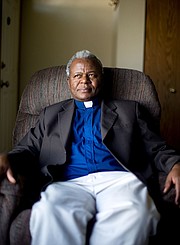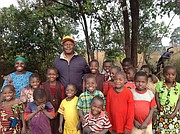Tanzanian priest fights for orphans
RATHDRUM — Fr. Bruno D. Mgaya remembers sleeping under trees in his native Tanzania as a frightened child with nowhere to go.
"I grew up very, very impoverished and by myself," he said Monday, seated at the kitchen table of his sparse and humble Rathdrum home. "When I became a priest, I thought, 'Well, you can forgive everything, but you can’t forget who you’ve always been.'"
Now a priest at St. Stanislaus in Rathdrum and St. Joseph's Catholic Church in Spirit Lake, Mgaya has a heart for the orphans of Tanzania because he knows exactly what they are going through. Mgaya's father was abusive; his mother was emotionally damaged and she tried to raise six children on her own. But by the time he was 5, he was essentially abandoned and was never with his mother again.
He was shuffled around from his uncle's house to his married sister's home where he wasn't welcome. He stayed with her family until he was 7, when he finished the fourth grade and was able to move on to middle school. But he had no warm safe home, no loving parents and was homeless much of the time.
"That's where my disaster started," he said. "One thing, I thank God I didn't drop away from school. But hanging on was really a tough feat. I didn’t have any support. I was working, even when I was in school. On Saturdays, I would go out and wait for the teachers and collect firewood and give it to them and they’d give me a little penny and it would help me buy exercise boots and all that stuff. At the same time, I had to go around begging, and most of the time the priests would help me.
"At night you have to find a place where you can stay," he continued. "I have a very challenged background. I don’t like to talk much about it because it brings me some kind of pain. But you can prevent those feelings hurting you just through tears sometimes."
It was in 1996 that Mgaya, now 63, decided he needed to do something to keep more orphans from suffering the difficult, lonely childhood he experienced.
In Tanzania, located in eastern Africa, there are 3.5 million orphans in a population of nearly 45 million. Mgaya said the country has always had orphans because of diseases such as malaria and mothers dying in childbirth.
"But when AIDS came, it kind of tipped the balance," he said, emotion in his thick African voice. "So now you have kids who nobody wants to take them, but they are so small they can’t fend for themselves. And sometimes you find a kid at 7, 8 years old becoming the parent of the family because she or he has siblings to take care of because the mother and father died."
Once Mgaya made it through the school system in his village and became an ordained priest June 6, 1982, life became a bit easier. He had a little plot of land and his independence, but he could never forget the hardships of being a child without a secure home.
"It was painful," he said. "That’s why my primary thing today, no matter what people speak, when an orphan, I say I’ll provide them with a living space."
Mgaya welcomed orphans onto his land, realizing he could make a difference in at least a few of their lives.
"I said, ‘Maybe I could put one child there, because he had nowhere to go,’ and that’s what I did,” he said.
In exchange for a shelter where they would be safe, the children helped with gathering firewood and feeding chickens and other tasks. Then in 2002, Mgaya's priestly duties called him away from his village of Mafinga to the north side of the country; he didn't want to leave the orphans all alone, so he came up with a plan.
"There’s another group which is miserable — the widows," he said.
He explained that the idea is P.O.W.E.R., or "The Pairing of Orphans and Widows for Empowerment and Resilience."
"You pair them so they become tougher,” he said. "It is a powerful resilience."
With the help of kindhearted benefactors, selfless widows and people who care about these children's futures, Mgaya and his colleagues created the nonprofit Tanzania Orphan's Upendo Community, which recruits widows, single moms or women who have never married to care for orphans ages 3-12. These communities pull kids off the streets and help them flourish socially and psychologically in a safe environment. The orphans are sent to elementary school and taught about agriculture and farming as well as how to be responsible for working and feeding themselves.
"I love them and I want to help them but I will not spoil them," Mgaya said. "I want them to know that the fruits don’t come from the shop, they come from a tree. They can grow it and water it and they can see it. Every kid must irrigate."
An important part of this endeavor is for the children to grow up in loving environments — "upendo" is a Kiswahili word meaning "charity/love." And it's something that has worldwide ripple effects. Mgaya said this approach is crucial for combating the global terror groups that prey on the young and impoverished.
"They are using these poor people who have little to no hope in life," he said. "The more we have of these kids on the streets, who are jobless and can’t find a job because they never went to school, they never went to school because nobody cared for them and they didn’t have a chance to go to school because nobody helped them, well, these wars will never end. These will be the best recruits for Boko Haram, Isis … but if we can, through this system, send these kids to school, let them have a decent job and their own living, we are fighting against this crisis."
Mgaya will be returning to Tanzania this summer to complete construction on a kindergarten and a chapel that he started building last year. He said capital donations and volunteers are always welcome to continue expanding this program to help even more orphans live better lives.
"These kids, when they come into the town, they want to live like you live. They haven’t been raised up morally so they are prone to do anything, they will kill you and take your car. If you look at the bigger picture, this is a global thing," he said. "We can prevent this by helping them — staying religious, let them learn a trade, go to school — and again, if we can have leaders from these kids who have passed through, and we keep them in the system, they can really change the company because they know how troubling it is."
For information, contact Tanzania Orphan's Upendo Community treasurer Marilyn Chastain at Chastain.marilyn@gmail.com or via phone at (208) 345-1101 or (208) 250-9335, or email Mgaya at fabrude@yahoo.com.





